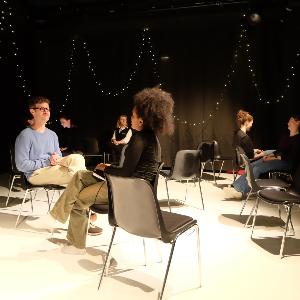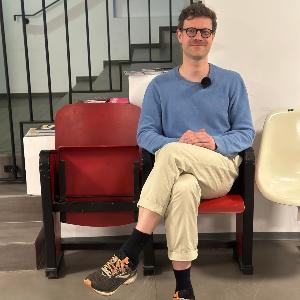The Studiobühne theater at LMU: a space for experimentation
19 May 2025
Students of theater at LMU have their own playhouse where they can experiment under professional conditions.
19 May 2025
Students of theater at LMU have their own playhouse where they can experiment under professional conditions.

© LMU
When you descend the steps to the Studiobühne theater in Munich’s historic district, you enter another world. A few meters below the bustle of the metropolis, the final rehearsals for the play “Partici|bait – A Tender Confrontation Workshop” are underway in an atmosphere of intense concentration. There is no stage for this performance. Instead, the actors sit in the audience and strike up deliberately unnerving conversations with the public.
“Participation theater is one of those things people either love or hate,” explains the new director of the Studiobühne theater with a grin. Markus Kubesch took over the role in January 2025 from Dr. Katrin Kazubko, who had held the position for 31 years. One of the main reasons why audience members refuse to participate is cited by the students in their play itself: fear of embarrassing themselves in public.
“But it’s all voluntary,” says an actor at the rehearsal. Although there is no written script, the play does not trade in shock moments or sudden ambushes of the audience. Rather it’s about discovering the meaning and limits of participation. “Our experiment calls into question the classic evening at the theater and removes the boundary between audience and stage,” she calls into the auditorium, which is all decked out with string lighting.
This fits well with Kubesch’s conception of the Studiobühne, which he describes as a “theater laboratory and space for experimentation.” For over 50 years, young students of directing, acting, dramaturgy, stage design, and related fields have been able to explore and try things out in this theater. In the 1990s, practical theater work was incorporated into the program. And then in 2015, the Institute of Theater Studies’ stage in Ludwigstrasse 25 had to make way for a construction project. Since 2018, the theater has had a new home in Neuturmstrasse 5.
The Studiobühne is a prime example of how young people can combine theory and practice during their studies and have an impact on society, remarks Kubesch. “It’s an incredible luxury to have a place to try things out without a fixed outcome under professional conditions.” Accordingly, the boards that mean the world, in Schiller’s memorable phrase, are integrated in the curriculum in multiple ways: by doing a theater internship in an elective course, for instance, or the option of participating in plays, or even launching one’s own projects.
“For studying theater, the Studiobühne may not be strictly necessary, but it is vital,” says Kubesch, quoting his predecessor. In a discussion on the margins of the rehearsal, he explains how he organizes the monthly theater meetings, supports the students in realizing their ideas on the stage, and assists during the final rehearsals at the latest. In this way, four to five plays are staged every semester. It fascinates him every time how the individual participants become a close-knit group after just a few weeks.
Parents, friends, and classmates come to the performances, but also many guests of the institute. Through the numerous collaborations – with the August Everding Theater Academy, say, or the Bavarian State Opera – there are also many reciprocal visits between theater organizations. Due to the proximity to the Otto Falckenberg School, the Münchner Kammerspiele, and the Residenztheater, moreover, alumni and other curious onlookers from the theater world often come to see the plays. In addition to the collaborations, there are intercultural exchanges with universities and theaters around the world. The Studiobühne can now look back on guest appearances in Canada, Morocco, the United States, France, Russia, and Ukraine. And Studiobühne productions have won several awards at festivals.

Has finally turned his dream into a profession: Markus Kubesch | © LMU
Kubesch looks at his predecessor with great admiration for her technical skill. “At a meeting, I soaked up as much as I could of her vast experience,” he recounts. At the same time, he wants to put his own stamp on the Studiobühne and compete less with the state theater on the terrain of classical plays, but emphasize the inquiring aspect of theater. In the Applied Theater course, for example, students learn to artistically engage with various professional, cultural, and social backgrounds while seeking to inspire social change.
With Kubesch’s biography, this is no surprise. Born in Austria, the son of a diplomat had to move around a lot during his childhood and adjust to new cultures. Theater was his dream. “But for a long time, I didn’t have the courage to pursue a career in theater – and risk failure,” he admits. After completing his schooling at a high school for musical education in Vienna, he decided to study business.
But theater would not let him go and he spent every free minute there. So he decided “very naively” to apply for an acting and directing course at the renowned Mozarteum in Salzburg – and actually got a place. It was there that he discovered his love for working with young people. In 2024, he obtained his doctorate at the University of Duisburg-Essen with an intercultural project in the area of theater education.
He became director of the Studiobühne in the traditional way: “I saw the ad and applied for the job,” he laughs. We ask him if he would like to do the job until retirement, like his predecessor. The question is not entirely serious, as Kubesch is just 42 years old. But he does not skip a beat: “Yes, the ambition and passion are definitely there.” Working with young people and guiding them in their development gives him a lot of pleasure. “Moreover, you can see from Katrin Kazubko that it keeps you young when you’re constantly challenged by students and have to question your own stance.”